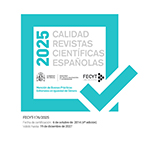Necesidades de naturaleza emocional de docentes en contexto de pandemia
Resumen
INTRODUCCIÓN: Aunque se ha generado evidencia sobre el impacto positivo de la formación emocional en docentes, existe la necesidad de levantar datos empíricos y situados sobre el rol que tiene la dimensión emocional en el ámbito escolar en el contexto de la emergencia sanitaria, para el diseño, implementación y evaluación de procesos que permitan incrementar competencias/habilidades/destrezas emocionales en el profesorado. Dado lo anterior, esta investigación tiene como objetivo identificar necesidades de naturaleza emocional relacionadas con el trabajo de clase de docentes en contexto de pandemia. MÉTODO: Se realizó un análisis cualitativo de una entrevista grupal realizada a 54 docentes de dos centros educativos de las regiones de Valparaíso y Ñuble, en Chile. RESULTADOS: Las necesidades de índole emocional detectadas en esta investigación corresponden a: adquisición de herramientas de tolerancia a la frustración y regulación emocional, aprendizaje de estrategias para el manejo de la ansiedad y estrés, así como el requerimiento de reforzar una mirada positiva y de optimismo. DISCUSIÓN: Las dificultades que provoca el trabajo telemático y la compatibilización de roles y tareas que le corresponde al profesorado como miembro de una comunidad escolar y de su grupo familiar, derivan preferentemente de experiencias displacenteras asociadas a emociones como frustración, ansiedad, estrés, tristeza y pena, lo cual debe llevar al reconocimiento de necesidades que orienten el diseño de propuestas de acompañamiento a los integrantes de las comunidades educativas, desde una perspectiva situada, ajustada a sus requerimientos.
Descargas
Descarga artículo
Licencia
La Revista Complutense de Educación, para fomentar el intercambio global del conocimiento, facilita el acceso sin restricciones a sus contenidos desde el momento de su publicación en la presente edición electrónica, y por eso es una revista de acceso abierto. Los originales publicados en esta revista son propiedad de la Universidad Complutense de Madrid y es obligatorio citar su procedencia en cualquier reproducción total o parcial. Todos los contenidos se distribuyen bajo una licencia de uso y distribución Creative Commons Reconocimiento 4.0 (CC BY 4.0). Esta circunstancia ha de hacerse constar expresamente de esta forma cuando sea necesario. Puede consultar la versión informativa y el texto legal de la licencia.











